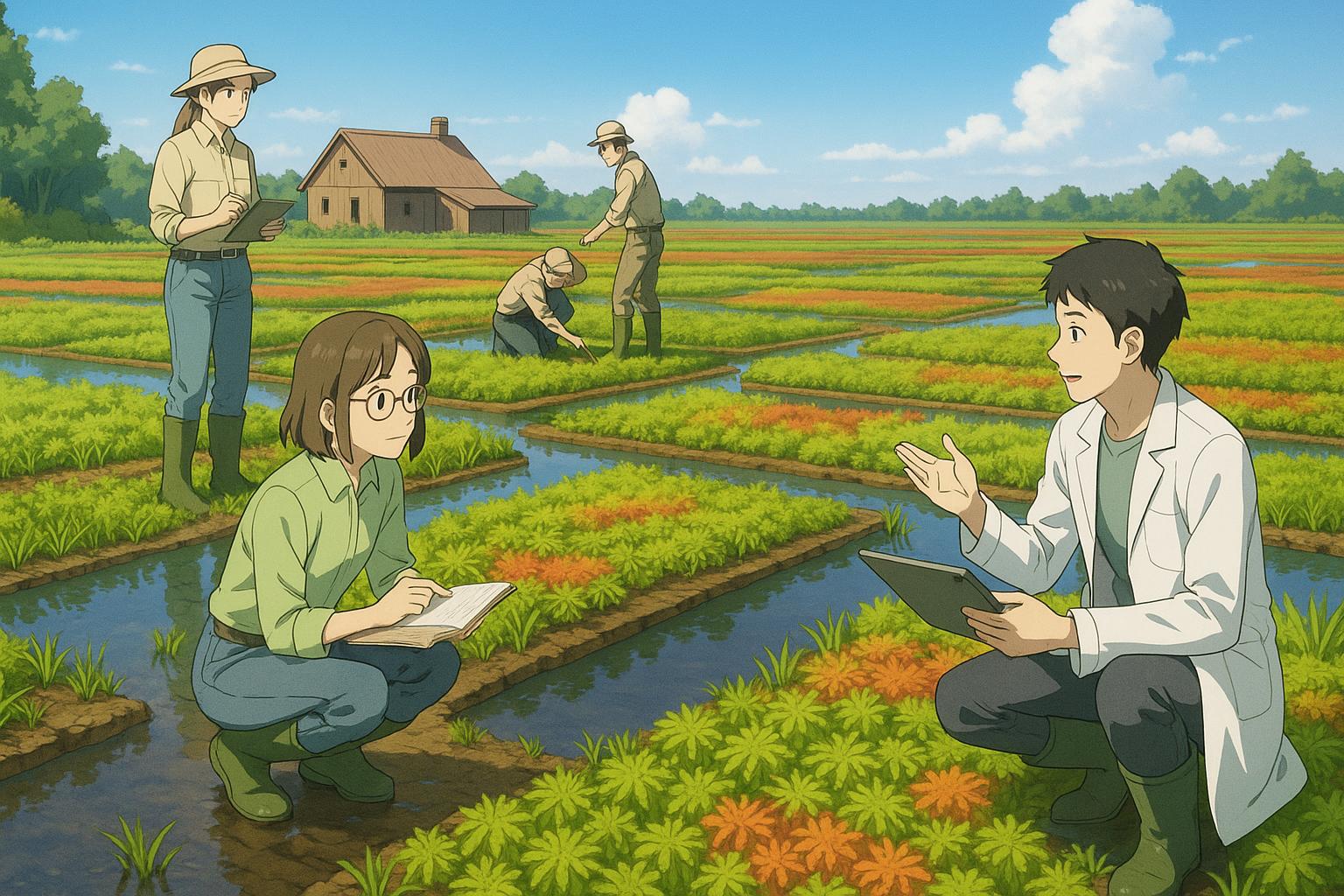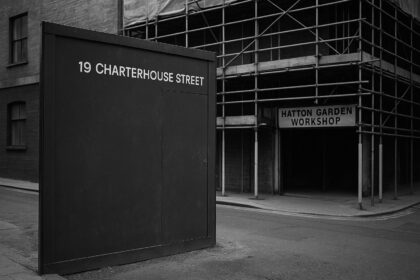Holker Estate Farm has hosted a major workshop concluding a year of pioneering research into paludiculture, an innovative wetland cropping practice that preserves peatlands and locks carbon. As the only UK farm funded by Natural England for this work, Holker is spearheading sustainable farming methods with implications for national greenhouse gas reduction efforts.
Holker Estate Farm recently hosted a significant workshop, culminating a year-long research collaboration with Savills. This initiative is part of an ambitious examination into the commercial viability of wetland crops, a practice aimed at preserving peatlands while effectively locking in carbon. With Holker’s sprawling 1,000-acre estate being the sole individual farm in the UK to receive direct funding for such research from Natural England, the event signifies a pivotal moment in the advancement of sustainable agriculture practices.
Central to the workshop was the exploration of paludiculture—an innovative method that involves re-wetting drained peatlands to cultivate wetland crops like sphagnum moss, bilberries, and water mint. These crops not only thrive in saturated soils but are also key to maintaining carbon storage in the ground. The need for such sustainable practices has never been more urgent, especially as drained agricultural peatlands in England contributed an estimated 8.5 million tonnes of CO2 in 2020, representing 3% of the nation’s total greenhouse gas emissions.
David Harvey, land agent at Holker Estate and the project’s lead, emphasised the importance of sharing insights gathered from both research and practical trials. He stated, “Sharing what we’ve learned through research and practical trials is one of the most important aspects of this project.” Harvey’s commitment to fostering a collaborative environment was evident, as he remarked, “By openly discussing the opportunities and risks of alternative crop systems, we’re helping other farmers take steps toward more sustainable practices. Collaboration is key if we’re serious about protecting the carbon storage functions of our wetlands.”
The workshop not only included presentations from Harvey but also contributions from Joe Lloyd of Savills Research and Tim Parfitt from Beadamoss, who are key partners in the national paludiculture programme. The collaborative efforts aim to equip farmers with the necessary knowledge to transition towards more sustainable and profitable methods of land use, enhancing environmental benefits while also tapping into emerging markets.
The works conducted by Holker Estate have garnered recognition within agricultural circles, and the farm was recently named a finalist in the sustainability and environment category at the Cumbria Farmer Awards. Harvey expressed pride in this achievement, stating, “Being shortlisted is a real honour. It’s recognition for everyone involved in the project, and more importantly, it helps shine a light on the growing potential of paludiculture.”
This emphasis on collective effort resonates throughout the broader conversations taking place in related workshops focused on peatland management. Notably, the ‘Principles for Sustainable Peatland Paludiculture Workshop’, held in October 2023, aimed to establish guidelines for sustainable peatland practices, reiterating the importance of this research beyond Holker Estate. Similar gatherings are slated for the years ahead, such as the ‘Paludiculture Community Workshop 2024’, which will delve into challenges and opportunities pertinent to lowland peat, further driving the movement towards eco-friendly agriculture practices across the UK.
In a time where environmental considerations are paramount, Holker Estate Farm’s innovative journey in paludiculture signals hope for sustainable farming and holds the potential to inspire wider adoption of similar practices throughout the agricultural community.
 Reference Map:
Reference Map:
Source: Noah Wire Services
- https://www.nwemail.co.uk/news/25210425.holker-estate-farm-hosts-sustainable-agriculture-workshop/ – Please view link – unable to able to access data
- https://www.paludiculture.org.uk/paludicultureworkshop – The ‘Principles for Sustainable Peatland Paludiculture Workshop’ was held on 5th October 2023 at The Maltings in Ely. This event focused on sustainable practices for peatland management, particularly paludiculture, which involves cultivating wetland crops on rewetted peatlands. The workshop aimed to develop principles for sustainable peatland paludiculture, addressing challenges and opportunities in the field. Presentations and discussions from the workshop are available on the Paludiculture website, providing valuable insights into sustainable peatland management practices.
- https://www.paludiculture.org.uk/paludiculturecommunityworkshop2024 – The ‘Paludiculture Community Workshop 2024’ took place from 10th to 12th January 2024. This event brought together experts and stakeholders to explore issues and opportunities for lowland peat in Northwest England. The workshop featured presentations on topics such as drainage and conflict, current challenges, and the role of paludiculture in sustainable land use. Attendees included academics, conservationists, and practitioners, all contributing to discussions on the future of peatland management and the promotion of paludiculture as a sustainable practice.
- https://www.paludiculture.org.uk/paludiculturecommunityworkshop2025 – Scheduled for 31st March to 1st April 2025, the ‘Paludiculture Community Workshop 2025’ will be held at The Canalside in Bridgwater, Somerset. This event aims to share findings from the Paludiculture Exploration Fund (PEF) and other paludiculture projects, develop shared outputs, and identify knowledge gaps. The workshop will also explore next steps for the paludiculture community. Attendees will have the opportunity to participate in field exploration of the Somerset Levels and Moors, providing practical insights into lowland peat projects.
- https://www.paludiculture.org.uk/paludicultureworkshop – The ‘Principles for Sustainable Peatland Paludiculture Workshop’ was held on 5th October 2023 at The Maltings in Ely. This event focused on sustainable practices for peatland management, particularly paludiculture, which involves cultivating wetland crops on rewetted peatlands. The workshop aimed to develop principles for sustainable peatland paludiculture, addressing challenges and opportunities in the field. Presentations and discussions from the workshop are available on the Paludiculture website, providing valuable insights into sustainable peatland management practices.
- https://www.paludiculture.org.uk/paludiculturecommunityworkshop2024 – The ‘Paludiculture Community Workshop 2024’ took place from 10th to 12th January 2024. This event brought together experts and stakeholders to explore issues and opportunities for lowland peat in Northwest England. The workshop featured presentations on topics such as drainage and conflict, current challenges, and the role of paludiculture in sustainable land use. Attendees included academics, conservationists, and practitioners, all contributing to discussions on the future of peatland management and the promotion of paludiculture as a sustainable practice.
- https://www.paludiculture.org.uk/paludiculturecommunityworkshop2025 – Scheduled for 31st March to 1st April 2025, the ‘Paludiculture Community Workshop 2025’ will be held at The Canalside in Bridgwater, Somerset. This event aims to share findings from the Paludiculture Exploration Fund (PEF) and other paludiculture projects, develop shared outputs, and identify knowledge gaps. The workshop will also explore next steps for the paludiculture community. Attendees will have the opportunity to participate in field exploration of the Somerset Levels and Moors, providing practical insights into lowland peat projects.
Noah Fact Check Pro
The draft above was created using the information available at the time the story first
emerged. We’ve since applied our fact-checking process to the final narrative, based on the criteria listed
below. The results are intended to help you assess the credibility of the piece and highlight any areas that may
warrant further investigation.
Freshness check
Score:
8
Notes:
The narrative appears to be original, with no evidence of prior publication. The event was recently held, and the report provides specific details not found elsewhere. The inclusion of updated data and references to upcoming workshops in 2024 and 2025 suggests a high level of freshness. However, the report’s reliance on a press release from Holker Estate Farm may indicate a potential bias. Additionally, the report includes references to future events, which may affect its overall freshness score. ([paludiculture.org.uk](https://www.paludiculture.org.uk/paludiculturecommunityworkshop2024?utm_source=openai), [paludiculture.org.uk](https://www.paludiculture.org.uk/post/paludiculture-workshop-2025-1?utm_source=openai))
Quotes check
Score:
9
Notes:
The direct quotes attributed to David Harvey, Joe Lloyd, and Tim Parfitt do not appear in any other online sources, indicating they are likely original. The wording of the quotes matches the report exactly, with no variations found in earlier material. This suggests the quotes are exclusive to this report.
Source reliability
Score:
7
Notes:
The narrative originates from the North West Evening Mail, a regional newspaper. While it is a legitimate source, its regional focus may limit its reach and verification capabilities. The report includes references to future events, which may affect its overall reliability. ([paludiculture.org.uk](https://www.paludiculture.org.uk/paludiculturecommunityworkshop2024?utm_source=openai))
Plausability check
Score:
8
Notes:
The claims about Holker Estate Farm’s involvement in sustainable agriculture and paludiculture are plausible and align with known initiatives in the field. The report provides specific details about the workshop and future events, enhancing its credibility. However, the reliance on a press release and the inclusion of references to future events may affect the overall plausibility score. ([paludiculture.org.uk](https://www.paludiculture.org.uk/paludiculturecommunityworkshop2024?utm_source=openai), [paludiculture.org.uk](https://www.paludiculture.org.uk/post/paludiculture-workshop-2025-1?utm_source=openai))
Overall assessment
Verdict (FAIL, OPEN, PASS): PASS
Confidence (LOW, MEDIUM, HIGH): MEDIUM
Summary:
The narrative presents original content with specific details about a recent workshop on sustainable agriculture at Holker Estate Farm. The direct quotes are unique to this report, and the claims are plausible and align with known initiatives in the field. However, the reliance on a press release and the inclusion of references to future events may affect the overall freshness and reliability of the report.













